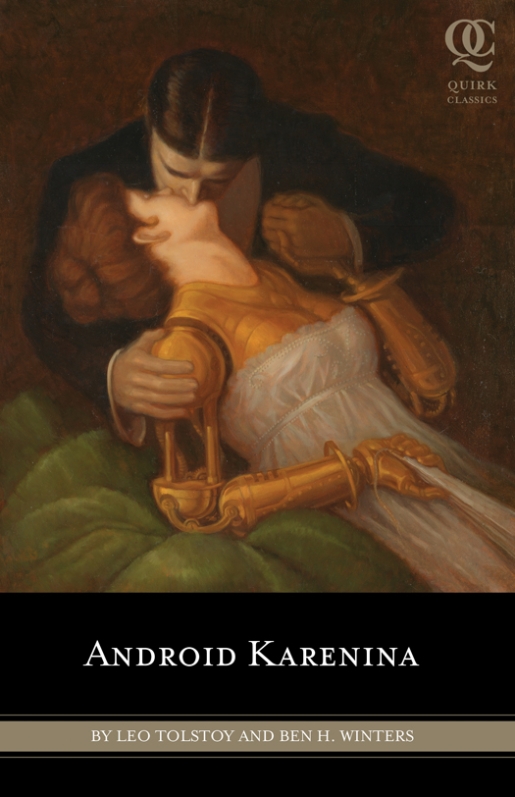"Malfunctioning robots are all alike; every malfunctioning robot malfunctions in its own way". This way opens Ben H. Winters his own review of this classic by Tolstói. Of course, Android Karenina won't remain indifferent anybody who reads it. The general plot merges us in a Russian XIXth century where groznium was discovered, an alternative energy source that allows, in spite of the supply, the creation of of android of any kind of category: From mice to entertain every pet, to governesses for children or even Category III, companions for all those who can afford it, these can even record moments of your life to watch them later or send messages with no need of moving from a chair in your house. Definitely, Android Karenina is a fledged steampunk novel.
I guess that the general plot must begin in Tolstói's novel, a woman that is engaged with a ministerial high-up with too much political aspirations that make him to set aside his wife. In this way, Anna Karenina feels alone, and finishes falling in love with the count Vronsky (calm down, there's no spoiler, these are the first pages). It can look like a trigger like any other, but when machines begin to affect to the quality of the human life, everything completely changes. To this we have to add the appearance of a religion that takes shape around the Illustrious Visitors, a series of aliens that will come tothe Earth to save the mankind. Or that's what the Russian aristocracy believes. Although all these points are slow to start and make the first part a little bit sluggish, little by little the pieces of this puzzle will fit each other and will make a really dramatic turn when finally the androids begin to have their own voice in this story.
Although I'm not a real supporter of some of the characters, because they irritate me too much, as Kitty Scherbatsky (but I ended taking her love), I love the fact that no one of them is perfect, excepting the bad guy, he's the perfect bad guy. It worths to read the whole book for him. All of them have that kind of duality of what's good and bad, fighting for their family or bowing to mother Russia, thinking in theirselves or in how will they be accepted in the society, the hard work or the comfort of having an android... I really also love the fact that there's a little introduction of how, in one side, is shown the comfort of having an android, that allows to avoid some works that are thought to be degrading for the humankind, but, in the other side, they take the work that dignify us. It's a short introduction to the historical Russian Revolution, something that I really liked.
I'm going to close saying that the novel, even though slow in the beginning, it's quite light while reading. In spite of that, the plot, that in the very beginning seems a simple love story in a retrofuturistic Russia, ends being a social fight, the man against the machine, the good against the evil, the known against the unknown... I'm not a great reader of this king of science fiction with big machines, aliens or time travels, but in this case I must recognice that it has convinced me.
* * * * *
Hoy le toca el turno a la obra editada por Umbriel en español, Androide Karenina. Una revisión del clásico de Tolstói en este nuevo género del mash up que está invadiendo de buena manera nuestras estanterías. Ben H. Winters se convierte así en un nuevo escritor dentro del género de ciencia ficción entrando por la puerta grande.
"Todos los robots que funcionan se parecen entre sí; pero cada robot que deja de funcionar falla por un motivo específico". Así abre Ben H. Winters su propia revisión del clásico de Tolstói. Desde luego, Androide Karenina no dejará indiferente a nadie que lo lea. La trama general nos sumerge en un siglo XIX ruso donde se ha descubierto el groznio, una fuente de energía alternativa que permite, ya no sólo el abastecimiento de las fábricas, sino la creación de androides de diferentes categorías: Desde ratones con los que entretener a las mascotas, hasta institutrices para los niños o incluso los Categoría III, acompañantes personales para todos aquellos que puedan permitírselo, los cuales pueden incluso grabar momentos de tu vida para verlos posteriormente o enviar mensajes sin necesidad de moverte del asiento de tu casa. En definitiva, Androide Karenina es una novela steampunk en toda regla.
Supongo que para la trama general debe partirse de la novela de Tolstói, una mujer casada con un alto cargo ministerial con demasiadas aspiraciones políticas que hacen que deje de lado a su esposa. Así, Ana Karenina se siente sola, y termina enamorándose del conde Vronsky (tranquilos, no hay spoiler, esto son las primeras páginas). Puede parecer un detonante como otro cualquiera, pero cuando las máquinas empiezan a afectar a la calidad de vida del ser humano, todo esto cambia por completo. A ello hay que sumar la aparición de la religión que se forma en torno a los Ilustres Visitantes, una serie de alienígenas que llegarán a la Tierra para salvar a la humanidad. O eso cree la alta nobleza rusa. Aunque todos estos asuntos tardan en arrancar y hacen que la primera parte sea algo lenta, poco a poco las piezas del puzzle irán encajando y darán un giro muy dramático cuando por fin los androides empiecen a tener voz propia en toda esta historia.
Aunque no soy muy partidario de algunos de los personajes, porque me irritan demasiado, como Kitty Scherbatsky (aunque terminé cogiéndole cariño), me gusta el hecho de que ninguno sea perfecto, a excepción del malo, que es el malo redondo. Sólo por él merece la pena leer la novela. Todos tienen esa dualidad del bien y el mal, el luchar por su familia o inclinarse ante la madre Rusia, pensar en sí mismos o en cómo serán acogidos en la sociedad, el trabajo duro o la comodidad de un androide... Me gusta también el hecho de que se vea una ligera introducción de cómo, por un lado, muestran la comodidad del androide, que evita algunos trabajos considerados denigrantes para el ser humano, pero, por otro lado, quitan el trabajo duro que dignifica al hombre. Es también una breve introducción a la Revolución Rusa histórica, algo que me sorprendió gratamente.
Como añadido, a lo largo de la novela podemos ir encontrando algunas ilustraciones que me llaman bastante la atención, pero creo que es cuestión de ir observándolas con detenimiento, así que como buen cotilla, decidí echarles un vistazo rápido cuando tuve el libro entre mis manos, una segunda vez mientras leía y una tercera vez cuando por fin había terminado. En ese tercer vistazo me han gustado mucho más que la segunda vez, ya que tampoco quería interrumpirme la lectura, pero sirven muy bien para ubicarte y ponerles cara a los personajes, así como a los androides, que algunos son curiosos cuanto menos.
Voy a cerrar diciendo que la novela, aunque lenta en el comienzo, es bastante amena en su lectura. Además, la trama, que en un principio parece una simple novela de amor en una Rusia retrofuturista, termina siendo una lucha social, el hombre contra la máquina, el bien contra el mal, lo conocido contra lo desconocido... No soy un ávido lector de este tipo de literatura de ciencia ficción con grandes maquinarias, alienígenas o viajes temporales, pero en este caso tengo que reconocer que me ha convencido.
"Todos los robots que funcionan se parecen entre sí; pero cada robot que deja de funcionar falla por un motivo específico". Así abre Ben H. Winters su propia revisión del clásico de Tolstói. Desde luego, Androide Karenina no dejará indiferente a nadie que lo lea. La trama general nos sumerge en un siglo XIX ruso donde se ha descubierto el groznio, una fuente de energía alternativa que permite, ya no sólo el abastecimiento de las fábricas, sino la creación de androides de diferentes categorías: Desde ratones con los que entretener a las mascotas, hasta institutrices para los niños o incluso los Categoría III, acompañantes personales para todos aquellos que puedan permitírselo, los cuales pueden incluso grabar momentos de tu vida para verlos posteriormente o enviar mensajes sin necesidad de moverte del asiento de tu casa. En definitiva, Androide Karenina es una novela steampunk en toda regla.
Supongo que para la trama general debe partirse de la novela de Tolstói, una mujer casada con un alto cargo ministerial con demasiadas aspiraciones políticas que hacen que deje de lado a su esposa. Así, Ana Karenina se siente sola, y termina enamorándose del conde Vronsky (tranquilos, no hay spoiler, esto son las primeras páginas). Puede parecer un detonante como otro cualquiera, pero cuando las máquinas empiezan a afectar a la calidad de vida del ser humano, todo esto cambia por completo. A ello hay que sumar la aparición de la religión que se forma en torno a los Ilustres Visitantes, una serie de alienígenas que llegarán a la Tierra para salvar a la humanidad. O eso cree la alta nobleza rusa. Aunque todos estos asuntos tardan en arrancar y hacen que la primera parte sea algo lenta, poco a poco las piezas del puzzle irán encajando y darán un giro muy dramático cuando por fin los androides empiecen a tener voz propia en toda esta historia.
Aunque no soy muy partidario de algunos de los personajes, porque me irritan demasiado, como Kitty Scherbatsky (aunque terminé cogiéndole cariño), me gusta el hecho de que ninguno sea perfecto, a excepción del malo, que es el malo redondo. Sólo por él merece la pena leer la novela. Todos tienen esa dualidad del bien y el mal, el luchar por su familia o inclinarse ante la madre Rusia, pensar en sí mismos o en cómo serán acogidos en la sociedad, el trabajo duro o la comodidad de un androide... Me gusta también el hecho de que se vea una ligera introducción de cómo, por un lado, muestran la comodidad del androide, que evita algunos trabajos considerados denigrantes para el ser humano, pero, por otro lado, quitan el trabajo duro que dignifica al hombre. Es también una breve introducción a la Revolución Rusa histórica, algo que me sorprendió gratamente.
Voy a cerrar diciendo que la novela, aunque lenta en el comienzo, es bastante amena en su lectura. Además, la trama, que en un principio parece una simple novela de amor en una Rusia retrofuturista, termina siendo una lucha social, el hombre contra la máquina, el bien contra el mal, lo conocido contra lo desconocido... No soy un ávido lector de este tipo de literatura de ciencia ficción con grandes maquinarias, alienígenas o viajes temporales, pero en este caso tengo que reconocer que me ha convencido.






1 Opiniones:
Estas revisiones bizarras de clasicos decimononicos cada vez me atraen más.
Tengo que buscar la colección completa hasta ahora.
Muy buena reseña m'nsieur, me ha convencido sin spoilear.
Publicar un comentario